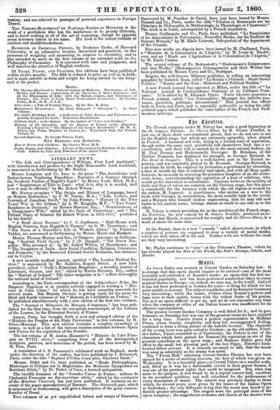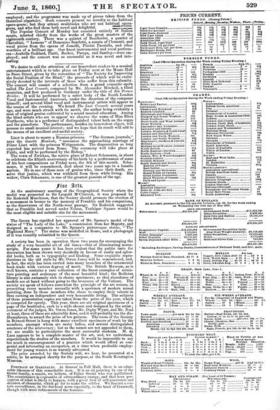31/noir. -
La Gazza Ladra was revived at Covent Garden on Saturday last. It is strange that this opera should require to be revived—one of the most beautiful and celebrated of Rossini's works: an opera that has had un- bounded popularity, and has been performed numberless times in every musical theatre in Europe—or, indeed, we may say, in the world. And yet it has not been performed in London foryears—a thing for which we are quite unable to account. The subject is pathetic, and its dramatic treatment very interesting; while the musk, written when Rossini's powers and fame were at their zenith, teems with the richest fruits of his genius. Nor is it an opera difficult to get up, and we do not remember any time when the company at either of our Italian houses was insufficient for its effective representation. The present Covent Garden Company is well fitted for it ; and its per- formance on Saturday last was one of the greatest treats we have enjoyed for a long time. Ninetta found a perfect representative in Madame Penco, whose beauty, simplicity, and deep but unexaggerated feeling, combined to form a living picture of the humble heroine. The character of the young lover was quite suited to Gardoni; as the old soldier, Ninet- ta's father, Faure reminded us of Tamburini ; the Podestd is one of the characters which have gained for Roneoni his reputation as one of the gieatest comedians on the opera stage ; and Madame Didiee gave full effect to the small but pleasing part of the boy Pippo, Ninetta's kind- hearted fellow servant. It. is scarcely necessary to add, that the music was sung as admirably as the drama was acted. The "Floral Hall' adjoining Covent Garden Theatre has now been opened for a series of morning concerts, the first of which was given on Wednesday. It is a beautiful place—a Crystal Palace on a smaller scale, and, filled as it was by a fashionable crowd in their gayest dresses, it was one of the prettiest sights that could be imagined. But, what was more to the purpose, it was found to be a capital concert-hall, excellent in its acousticalqualities, and well calculated for the performance of every description of music. The concert was precisely similar to those which, for several years were given by the lessee of the Italian Opera at Sydenham the only difference being that the music was heard to in- finitely greater advantage. The singers were the principal stars of the opera company; the magnificent orchestra and chorus of the theatre were
employed; and the programme was made up of pieces taken from the theatrical repertoire. Such concerts present no novelty to the habitual opera-goers; but they attract multitudes who are not habitual opera- goers, and who find them both novel and delightful. The Popular Concert of Monday last consisted entirely of Italian music, selected chiefly from the works of the great masters of the eighteenth century. There was a quintet of Boccherini, a quartet of Cherubini, " Lessons " of Domenico Searlotti, a sonata of Clementi, and vocal pieces from the operas of Jomelli, Pie,cini Paesiello, and other worthies of a brilliant age. Our finest instrumental and vocal perform- ers—Arabella Goddard, Piatti, Becker, Parepa, and Santley—were em- ployed; and the concert was as successful as it was novel and inte- resting.



























 Previous page
Previous page